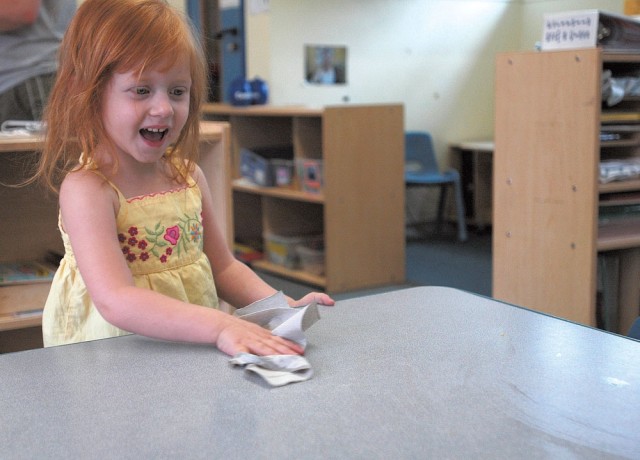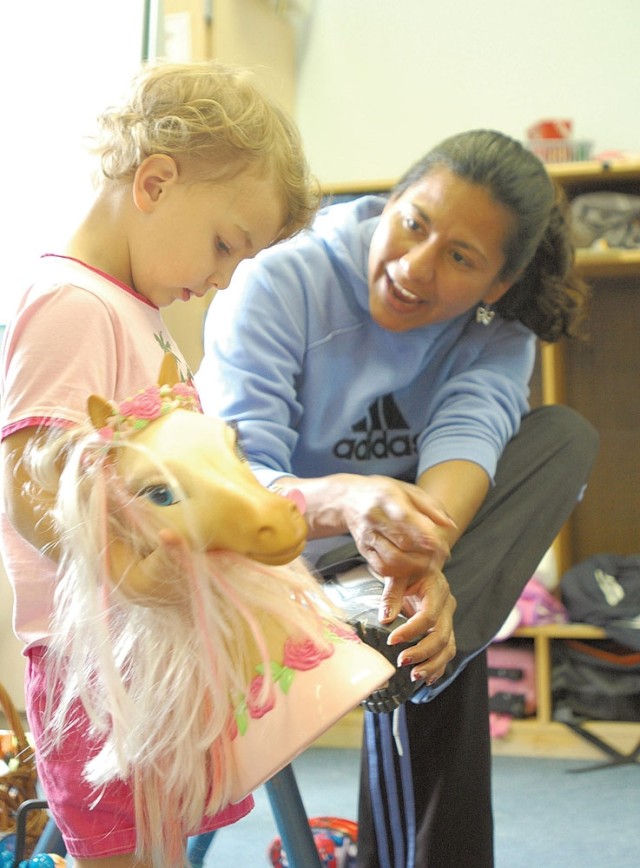HEIDELBERG, Germany - Three of the six child development centers in Baden-WAfA1/4rttemberg U.S. military communities have received accreditation by the National Association for the Education of Young Children, and the remaining three are nearing completion.
The CDCs were previously accredited by the association, but NAEYC has made the standards more stringent, and by Department of the Army mandate, the centers followed suit.
The staff of the Patrick Henry Village CDC in Heidelberg took 18 months to earn their accreditation, according to Aubrey McCaster, facilities director for Child and Youth Services.
"The accreditation process is so involved," McCaster said, "this is definitely not babysitting."
The most visible change parents can see, McCaster said, is child portfolios.
"Each child has a child portfolio to show the child's past, where the child is at now, and where we plan for the child to progress."
Developing the portfolios was a collaborative process between staff members, parents and the children.
"The children had a big hand in their own portfolios," said McCaster, adding that it was an accomplishment "they are proud of."
Now the portfolios are updated constantly, with teachers taking notes throughout the day, so the parents can see how their children are developing.
"They are living documents that grow with the child," McCaster said.
"The children are excited about something about them," he said. When they see all the accomplishments in their portfolio, "it gives them the idea that they can do a lot."
"The Army puts a lot of experts, resources, money and time toward the care of children," said Stayce Downing, non-appropriated funds support manager for U.S. Army Garrison Baden-WAfA1/4rttemberg.
The staff at the CDCs spent a lot of time studying the standards and changing the way the centers physically set up.
"The teachers had to meet certain requirements and had to work and study at home," Downing said. "There was a significant personal sacrifice to each employee in the CDCs."
McCaster said his staff spent a lot of time together during weekend events and evening training.
"We had to work ... as a team," McCaster said. "If you didn't, it wouldn't have happened.
Lead teacher, Michelle Junkin, said "everyone put in a lot of work ... it was all about the children."
"There were a lot of physical changes to the environment - new paint, new furniture, new rugs and equipment," McCaster said.
"We were given what we needed," he added.
Downing attributed such changes to the "Army's desire to instill that sense of security to the service members."
However, Downing said, "we're making a difference in the kids because of the requirements."
"Development is our business," said McCaster. "We focus on the gradual development of the children - physical, emotional, linguistic, intellectual - the overall total development of the whole child."
The child development "process has been standardized," Junkin said. "We know how to do it and why."
The NAEYC has 10 program standards: Relationships, Curriculum, Teaching, Assessment of Child Progress, Health, Teachers, Families, Community Relationships, Physical Environment, and Leadership and Management.
"We dealt with 10 standards, "McCaster said, "with 400 separate criterion assessed ... for our most experienced staff it was a big change, and our new staff was overwhelmed."
"A lot of parents are not aware of what is involved in the development of children," Downing said. Ultimately, she said, "the Army is doing what is best for the Soldier."
CDC STANDARDS
Relationships - According to the Accreditation Decision Report for the Mark Twain Village CDC, the program promotes "positive relationships among all children and adults to encourage each child's sense of individual worth and belonging as a member of a community and to foster each child's ability to contribute as a responsible community member."
Curriculum - The new curriculum "draws on research" and "assists teachers in identifying important concepts and skills," according to the report.
Teaching - The teaching staff use "multiple instructional approaches" to "optimize children's opportunities for learning," according to the report.
Assessment of Child progress - By using ongoing, systematic, formal and informal assessment approaches, the CDC provides information on the children's learning and development.
Health - The CDC promotes the nutrition and health of children and protects children and staff from illness and injury.
Teachers - The teaching staff has "the educational qualifications, knowledge, and professional commitment necessary to promote children's learning and development and to support families' diverse needs and interests," the report says.
Families - Reciprocal relationships between families and programs is essential to ensure that programs are meeting the needs of the children and families the program serves the report says.
Community relationships - The CDC establishes and maintains relationships with agencies and institutions that support it in achieving its goals.
Physical environment - The CDC creates an environment that fosters growth and development of the children.
Leadership and management - The CDC staff should administer the program efficiently and effectively, ensuring all staff, children, and families are included.




Social Sharing